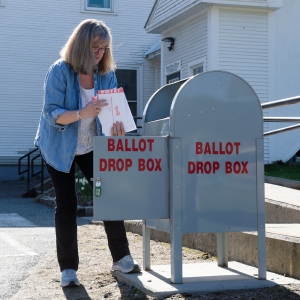Gile Hill condo owners face steep fee hikes
| Published: 10-04-2023 6:27 AM |
HANOVER — Condominium owners at Gile Hill are facing steep increases in their monthly homeowner fees to cover the costs of insurance and long-term maintenance.
Last month, the board of directors for the Gile Hill Condominium Owner Association notified the condo owners that their monthly dues would increase to $550 per unit beginning in January 2024.
For some residents, this amounts to a nearly 70% increase.
In addition, the COA announced a charge per unit of $3,000 to fund a special assessment to study ways to build the condo association’s capital reserves. In a letter to the residents, the COA said the funds raised from monthly dues, though adequate to cover daily maintenance, are not sufficient to pay for “the long-term upkeep of our aging buildings and infrastructure.”
Resident Sarah Heidebrecht, an associate director at the Dartmouth Engineering Advancement Office, said she worries how residents earning at or below the area median income will be able to afford these increases.
These increases “are not OK,” Heidebrecht said in a phone interview. “Legally it’s what the board is required to do, but it’s not OK.”
Overall, the owner’s association announced a proposed increase of nearly 36% next year in the monthly dues paid by condominium owners, due to a substantial hike in insurance rates and the need to build capital reserves for the development’s long-term upkeep.
Gile Hill — a 12-building development located near Dartmouth Hitchcock Medical Center — consists of 76 rental apartments and 44 condominiums.
Article continues after...
Yesterday's Most Read Articles
Seven of the condominium units are designated as “workforce housing” — meaning that they must be affordable at 80 to 120% of median household income for Grafton County, or $115,100 for a family of four.
Heidebrecht, a single parent, owns one of the community’s seven designated workforce-housing condominiums. She purchased her two-bedroom condominium in 2021 for $288,000. An affordable housing grant provided by Twin Pines Housing — a partner in the Gile Hill project — covered $70,000 of the purchase. Heidebrecht is responsible for the remainder.
In addition to general homeowner bills, condominium owners at Gile Hill pay monthly dues to the condominium owner association, which manages shared properties and services. The Gile Hill COA’s annual budget covers expenses such as street lighting, water and sewer infrastructure, trash services and insurance.
Heidebrecht said she does not fault the board for the additional costs. Rather she hopes to bring more community attention to these types of impacts on people living in workforce housing, as such issues are counterproductive to the efforts in the Upper Valley to make housing more affordable.
Next year’s dues will total $6,500 for the year. Much of this cost will cover the condo association’s insurance rather than go toward property or infrastructure improvements, Heidebrecht noted.
According to the board letter, the increase in monthly dues are primarily attributable to a change in insurance providers — necessitated after the Gile Hill COA was dropped by its previous carrier due to the COA’s costly claims history.
According to Heidebrecht, one of the most costly claims occurred in February when an external building pipe to a fire alarm sprinkler system burst, causing flooding in five condominiums and resulting in $300,000 of damage.
The condo association’s board said that its new insurance premium “increased by nearly 500% and now consumes roughly half of the COA annual budget.”
“While this insurance premium change was the single largest driver of the COA dues increase, the cost of other goods and services has also grown, as one might expect during this period of heightened inflation,” the board letter stated.
In addition, many Gile Hill condo owners — including Heidebrecht — will be impacted by a change in how the dues obligations are distributed. Historically, COA dues were calculated based on the square footage of the individual condos — meaning that owners of a smaller-sized condo would pay less in monthly dues than the owner of a larger condo.
However, the condo association’s attorney notified the board this year that New Hampshire law mandates that condo association dues must be equalized — meaning that each condominium owner pays the same amount in dues, regardless of the unit size.
As a result, owners of the smallest condominiums will see increases in their dues of up to 75% starting in January.
Heidebrecht said she does not fault the board for these additional costs. Rather she hopes to bring more community attention to these types of impacts on people living in workforce housing, as such issues are counterproductive to the efforts in the Upper Valley to make housing more affordable.
Beth McKinnon, president of the Gile Hill Condominium Owners Association, said the board members are also “saddened” by the proposed increase in fees.
“But New Hampshire condominium law requires assessments to be made based upon the cost of operating the (Condo) Association,” McKinnon said in an email.
The Gile Hill Condominium Owners Association was scheduled to discuss its proposed budget for 2024 at a meeting on Tuesday.
Patrick Adrian may be reached at padrian@vnews.com or 603-727-3216.

 Students take down pro-Palestinian encampment at UVM
Students take down pro-Palestinian encampment at UVM Sharon voters turn back proposal to renovate school
Sharon voters turn back proposal to renovate school Dartmouth administration faces fierce criticism over protest arrests
Dartmouth administration faces fierce criticism over protest arrests
